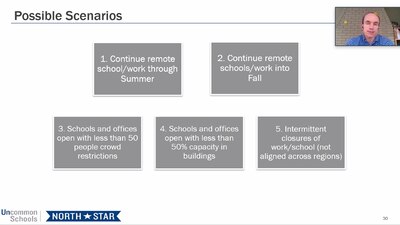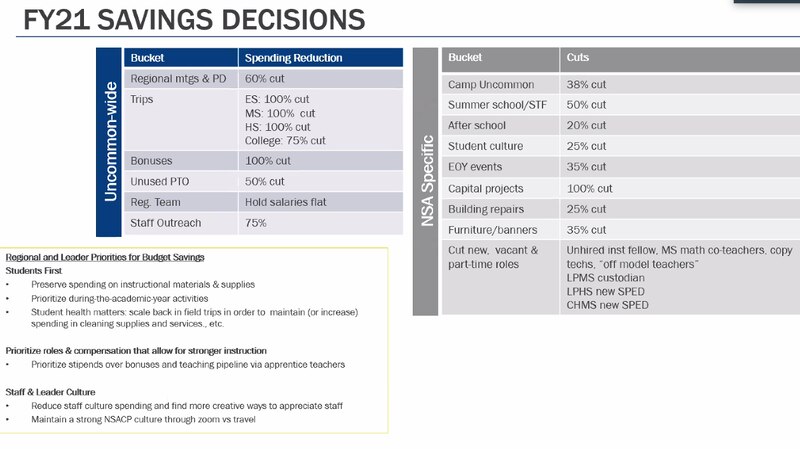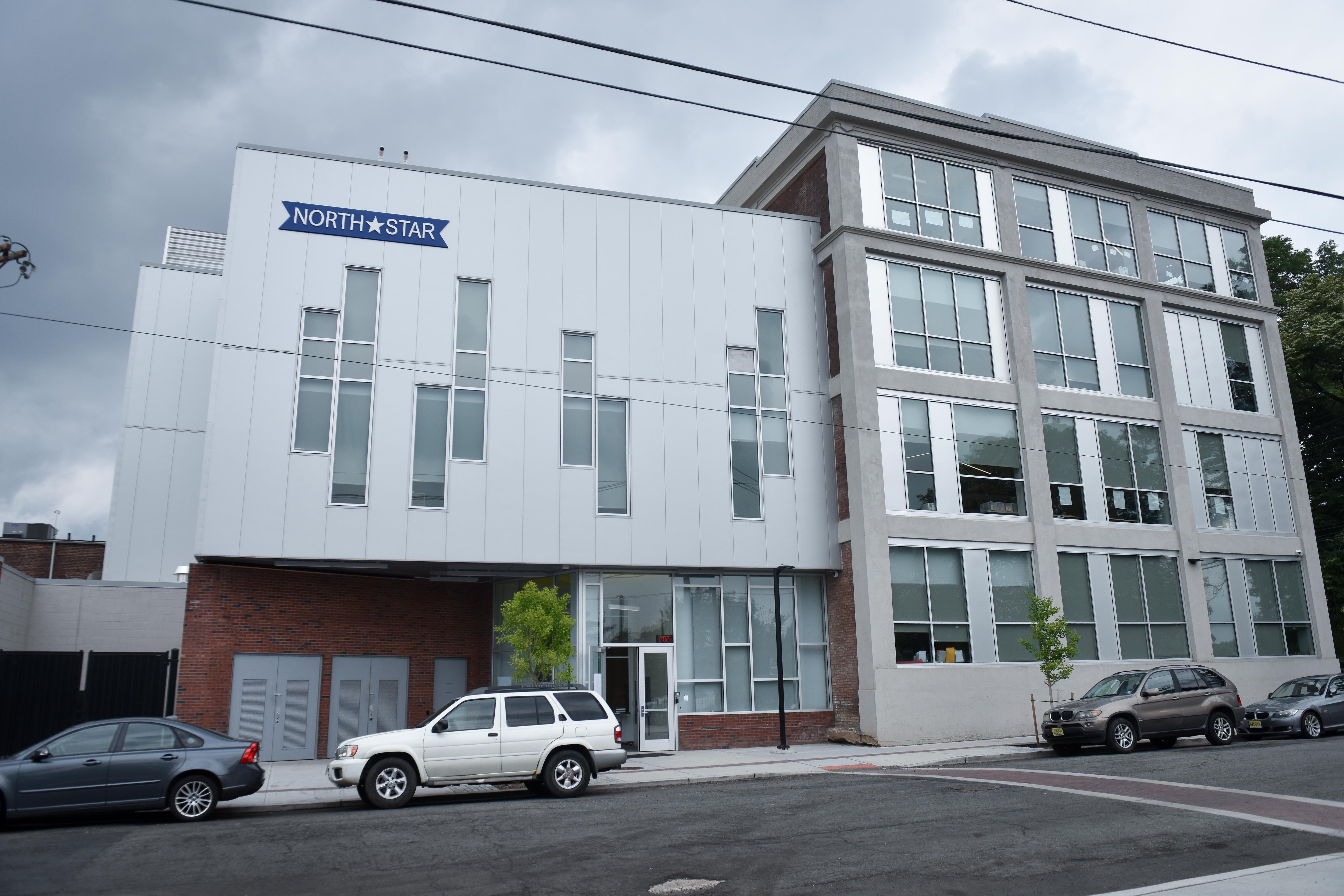With fears of a possible coronavirus resurgence this fall, Newark’s largest charter school network is planning for a new school year unlike any other.
North Star Academy’s more than 6,000 K-12 students might have to take all their classes online or come to school on alternating days Monday through Thursday with no live classes — online or in person — on Fridays, officials said at a board meeting this week. And rather than switching classes every period, high schoolers might be stuck in one classroom with the same classmates all day.
Whenever the network’s 14 schools do reopen, classrooms will likely remain half-empty to allow for social distancing, students will need to wear masks, and temperatures will be taken upon arrival, the officials said. The added costs of such safety measures combined with an expected slash in state aid has North Star officials bracing for deep spending cuts, including the elimination of staff bonuses, field trips, and new capital projects.
North Star’s reopening options and anticipated budget cuts are likely a preview of what’s in store for many schools this fall, traditional and charter. The network’s intense planning process and its continued uncertainty about what to expect also offer a window into how complicated — and potentially risky — it will be to reopen schools when there’s a highly contagious virus but no vaccine or reliable treatments.
“We’ve been working on this for over two months at this point and we still have not arrived at a definitive answer,” said Juliana Worrell, Uncommon Schools’ chief schools officer for grades K-8, at Monday’s board meeting. “Every day almost something’s changing that’s impacting the work.”
Uncommon Schools, which is North Star’s parent organization, manages charter schools in Massachusetts, New York, and New Jersey that enroll roughly 20,000 students. Uncommon officials turned to a range of sources to inform their reopening plans. They sought the advice of epidemiologists and other school districts, reviewed consultants’ recommendations, and studied countries in Europe and Asia that reopened their schools as the pandemic subsided.
One source they couldn’t consult is the New Jersey education department, which has yet to issue reopening guidance after schools statewide were ordered shut in March. Uncommon officials told their board of trustees Monday that they planned for various scenarios, including the state requiring schools to offer in-person classes this fall even if school leaders feel underprepared.
“They could say, ‘We need schools open, ready or not’ — which would be a disaster, but it’s not like there haven’t been some disastrous things done already,” said Paul Bambrick-Santoyo, Uncommon’s chief schools officer for high schools. “So we’re planning for all outcomes right now.”

The network planned for multiple scenarios this fall, including all classes remaining online, school buildings fully reopening with enhanced safety measures, and school buildings reopening at 50% capacity, which officials said appears most likely.
Uncommon is considering a number of options if schools must operate at half capacity, according to information shared at the board meeting. One is to keep general-education students learning remotely while targeted groups of students who would benefit most from in-person lessons — such as students with disabilities or those who struggle academically — return to classrooms.
Another option is to divide students into small groups that come to school at different times or on different days. For instance, one group of third-graders might take in-person classes Mondays and Wednesdays and do online work at home on Tuesdays and Thursdays. A second group would have the opposite schedule. There would be no live lessons on Fridays, which would give teachers time to plan and attend virtual training sessions, officials said.
High schools present a thornier logistical challenge because students in the same grade have different schedules depending on the classes they choose. One solution is to create “squads” of students who signed up for mostly the same classes. For instance, North Star’s Washington Park High School might have 30 different squads, half of which would come into school each day, said Bambrick-Santoyo. Each squad would stay in the same classroom all day while teachers rotate in order to reduce student mingling — and the potential spread of the virus.
But even with that arrangement, “there are so many variables to figure out,” said Bambrick-Santoyo, adding that a class of 120 seniors could have 60 different schedules.
Guidance from the Centers for Disease Control and Prevention recommends that students remain 6 feet apart. But Uncommon officials said even with 15 students in a classroom instead of the usual 30, it would be difficult to spread students that far apart. However, based on data from other countries, they believe it will be safe to move students slightly closer together so long as they wear masks, the officials said.
The network also plans to hold lessons throughout their buildings in order to bring the maximum number of students into school each day while still maintaining safe distances. However, the challenge is finding enough educators to teach the small, separated groups.
“We can’t have kids in every corner without a staff member to teach them,” Bambrick-Santoyo said.

The safety measures will introduce new expenses such as face masks, cleaning supplies, and student laptops. At the same time, North Star is anticipating a 5% cut in state funding, though Gov. Phil Murphy is not expected to submit a revised budget plan until late August.
“We’ll have less money from the state to fund the school next year,” North Star board member Ravi Bellur said Monday, “and the school will have to spend a great deal more to serve its students.”
To account for the shortfall, Uncommon will eliminate staff bonus pay and freeze salaries, while North Star will scale back its after-school programs, make fewer building repairs, and eliminate some positions, according to a slide presented at Monday’s board meeting.
A North Star board member asked whether traditional public schools are also expecting a reduction in state aid. Christine Carvalho, Uncommon’s director of financial management, said that all New Jersey schools are waiting for Murphy’s updated budget — and most are likely girding for cuts.
“I have to imagine that they’re taking similar measures and reducing costs across the board,” she said.






